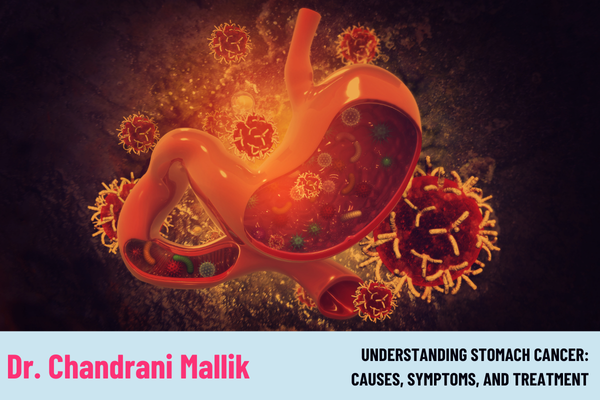Understanding Metastatic Cancer: Progression, Treatment Options, and Latest Advances with Dr. Chandrani Mallick
Metastatic cancer, often referred to as stage IV cancer, occurs when cancer cells spread from their primary site to other parts of the body. This stage represents a critical phase in cancer progression, requiring advanced treatment strategies and comprehensive care. Dr. Chandrani Mallick, a renowned medical oncologist in Kolkata, provides valuable insights into the nature of metastatic cancer, its progression, treatment options, and the promising advances in oncology.
1. What is Metastatic Cancer?
Metastatic cancer occurs when cancer cells break away from the primary tumor, travel through the bloodstream or lymphatic system, and form new tumors in distant organs. Common sites for metastasis include:
- Liver
- Lungs
- Brain
- Bones
Dr. Chandrani Mallick explains, “Metastatic cancer doesn’t mean the end of the road. With modern therapies, patients can experience improved survival rates and a better quality of life.”
2. How Does Cancer Spread?
Cancer metastasizes through a multi-step process:
- Invasion: Cancer cells penetrate nearby tissues.
- Intravasation: Cells enter the bloodstream or lymphatic system.
- Circulation: Cancer cells travel to distant organs.
- Extravasation: Cells exit the bloodstream and invade new tissues.
- Colonization: Cells form new tumors in the target organ.
Understanding this process helps oncologists like Dr. Mallick tailor treatments to disrupt cancer’s ability to spread.
3. Symptoms of Metastatic Cancer
Symptoms vary depending on the location of metastasis:
- Liver: Jaundice, swelling, abdominal pain
- Lungs: Shortness of breath, persistent cough
- Bones: Pain, fractures
- Brain: Headaches, seizures, dizziness
Dr. Mallick advises, “Early detection of metastasis through regular follow-ups and imaging tests is crucial for timely intervention.”
4. Treatment Options for Metastatic Cancer
Treating metastatic cancer involves a multidisciplinary approach to manage symptoms, slow cancer progression, and improve quality of life.
A. Systemic Therapies:
- Chemotherapy: Targets rapidly dividing cancer cells throughout the body.
- Immunotherapy: Boosts the immune system to fight cancer.
- Targeted Therapy: Focuses on specific mutations or proteins driving cancer growth.
- Hormone Therapy: Used for hormone-sensitive cancers like breast or prostate cancer.
B. Local Therapies:
- Radiation Therapy: Targets specific metastatic tumors.
- Surgery: Removes isolated metastatic tumors in select cases.
C. Palliative Care:
- Focuses on symptom relief and enhancing quality of life.
Dr. Mallick emphasizes, “No two metastatic cancer cases are the same. Personalized treatment plans are essential to address individual patient needs.”
5. Latest Advances in Metastatic Cancer Treatment
A. Precision Medicine:
- Tailors treatments based on genetic profiles of tumors.
- Helps identify targeted therapies with higher success rates.
B. Immunotherapy Breakthroughs:
- Drugs like checkpoint inhibitors have revolutionized cancer care.
- CAR-T cell therapy shows promise in treating blood cancers.
C. Liquid Biopsies:
- A non-invasive way to detect cancer mutations through blood tests.
- Enables real-time monitoring of treatment responses.
D. Artificial Intelligence (AI):
- AI is enhancing cancer diagnostics and predicting treatment outcomes.
Dr. Mallick notes, “Advances in cancer research are transforming metastatic cancer into a more manageable condition.”
6. Emotional and Psychological Support for Patients
Metastatic cancer brings emotional and psychological challenges for patients and families. Supportive care includes:
- Counseling and therapy
- Support groups
- Nutritional guidance
- Stress management techniques
Dr. Mallick stresses the importance of holistic care to address both the physical and emotional aspects of cancer.
7. Hope in the Fight Against Metastatic Cancer
While metastatic cancer remains complex, early detection, personalized treatment plans, and ongoing research offer hope. Patients are living longer and experiencing a better quality of life thanks to continuous advancements in oncology.
Dr. Mallick concludes, “Metastatic cancer care requires resilience, innovation, and compassion. Together, we can redefine possibilities for every patient.”
Take Control of Your Cancer Journey
If you or a loved one is navigating metastatic cancer, consult Dr. Chandrani Mallick for expert guidance, compassionate care, and advanced treatment options.
Your fight is our mission. Together, let’s face cancer with courage and hope.

